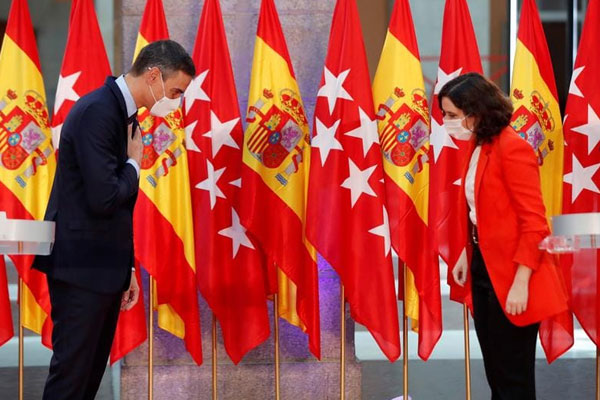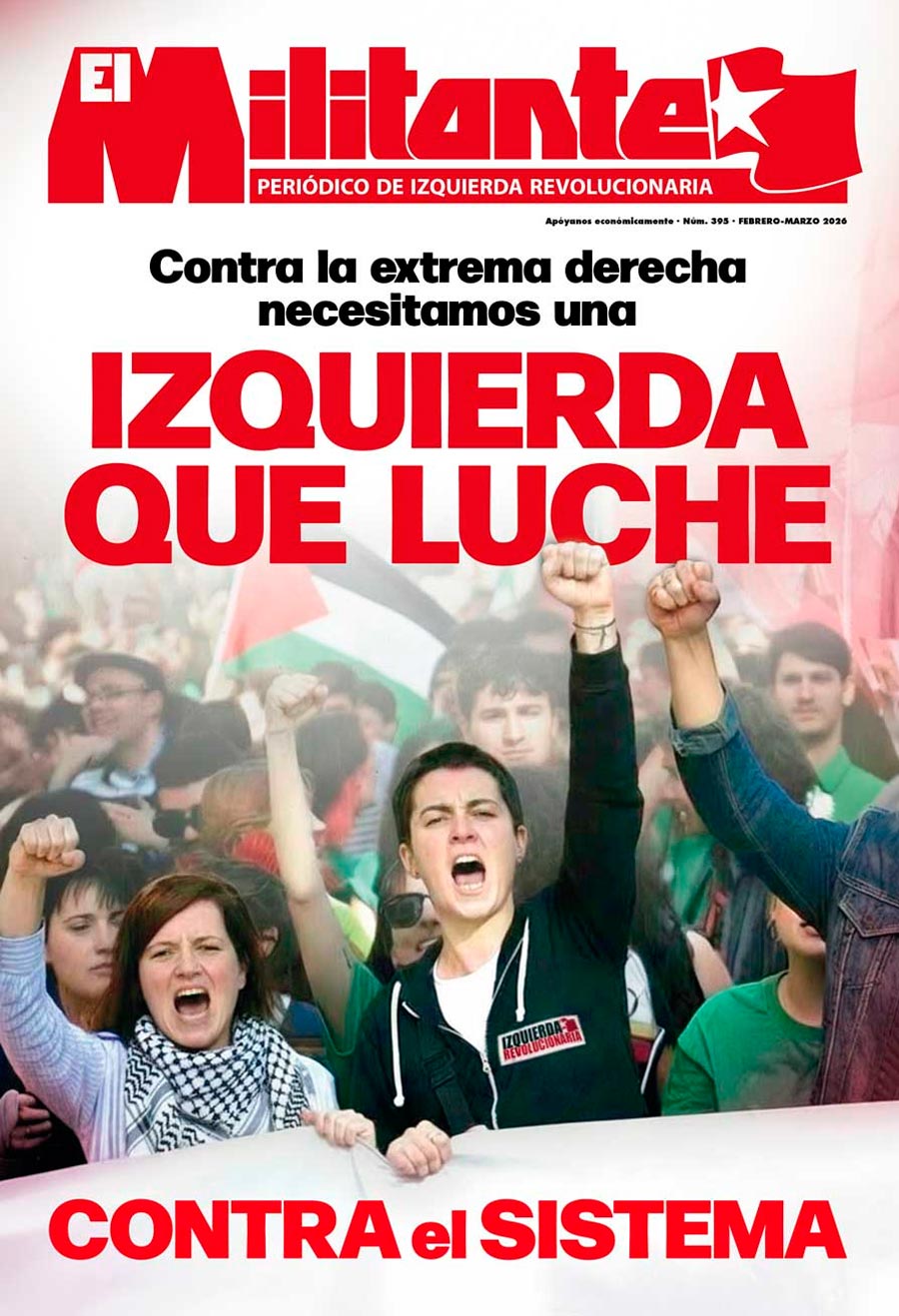The 4 May elections in the Community of Madrid have been a political earthquake. The resounding victory of Ayuso, who obtained 1,620,213 votes, 44.73% and 65 deputies - 35 seats and 900,361 more ballots than in 2019 - is a blow to the coalition government.
The punishment of Pedro Sánchez's policies has resulted in the worst result in history for the PSOE in Madrid, which only achieved 16.85% and 610,190 votes (losing 274,028 compared to 2019), dropping 13 deputies (from 37 to 24). An unmitigated setback.
The PP is the most voted party in all the districts of the capital and in most of the towns of the Community. Vox, in turn, gains one seat, from 12 to 13, and improves its results in some working-class areas. The high turnout, 76.25%, represents a formidable mobilisation, but not in favour of the left-wing bloc, but in favour of Ayuso's demagogic and reactionary discourse.
The rise of Más Madrid, which won 24 deputies, 614,660 votes and 16.97%, and surpassed PSOE for the first time, does not manage to compensate for the loss of Ángel Gabilondo.
The other big news is related to the resignation of Pablo Iglesias. Although Unidos Podemos increases from 7 to 10 deputies, obtaining 7.21% and 261,010 votes -an advance of 79,779 votes-, it is a modest result that does not meet the expectations raised.
What was not in the script was that the historic leader of Podemos, after resigning as vice-president of the government to fight the battle in Madrid and having been the main protagonist of the campaign, would suddenly and surprisingly announce that he was abandoning active politics.
The withdrawal of Pablo Iglesias, with the argument of giving way to "new leaderships", has taken thousands of left-wing activists and millions of UP voters by surprise. In our opinion, the way he has closed this chapter is completely wrong. Using the election stocktaking press conference to convey an image of desertion only gives ammunition to the right wing, which will obviously use it to the full. We will return to this important issue later.
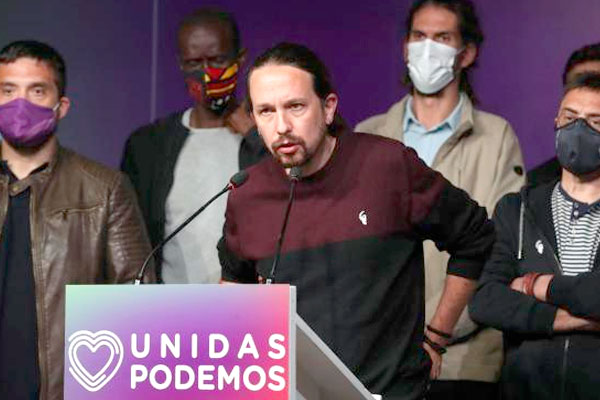
How could this have happened?
It is impossible to understand what happened in Madrid without reference to a series of facts and events that have taken place over the last period, and especially during the pandemic. Blaming the working class for being right-wing is the easiest thing to do, and also the way to blur everything by hiding the enormous responsibility that the politics of social democracy, both classic and 2.0, have in these catastrophic results.
It is clear to no one that the opposition of the parliamentary left to the government of Ayuso and Ciudadanos has been nil. The PSOE, and more specifically its spokesman Ángel Gabilondo, have reduced their work to hesitant gestures and constant calls for "loyal collaboration" between the regional government and the central government. Nor have Más Madrid and UP stood out for their belligerence, much less for calling for social mobilisation. None of the three parties have called for Ayuso's resignation for her infamous management of the pandemic.
In the most critical moments of the last year, the PSOE always reached out to Ayuso. When it was clear that the Madrid PP was condoning a massacre in privatised old people's homes, and approved circulars to prevent our sick grandfathers and grandmothers from being treated in hospitals, the Ministry of Health, headed by Salvador Illa, refused to intervene in any way to correct this deplorable situation.
The coalition government refused to force her to increase the staff and resources of public hospitals and clinics, but the president continued to sign agreements with the private health sector that made gold for the businessmen in the sector, or to open hospitals such as Zendal in precarious conditions despite the fact that their costs had skyrocketed. This was another unnecessary speculative operation, but one that served the tasty business of the cement and construction entrepreneurs very well.
When, in May last year, the reaction was demonstrating at the top of its lungs in Núñez de Balboa and Vox was trying to make its presence felt with pots and pans in the working class neighbourhoods of the capital, there were many of us anti-fascists who confronted them on the streets. However, the PSOE and the UP leadership called on us "not to fall into provocations" and to give them the streets. The same was repeated during the election campaign in Vallekas in the face of the provocation of Santiago Abascal and Rocío Monasterio.
On Friday 18 September, Díaz Ayuso decreed a confinement that exclusively affected neighbourhoods such as Vallekas, Carabanchel and Usera. The response of the population was not long in coming, and more than 50,000 residents took to the streets on Sunday 20 to reject these classist measures. What happened? The PSOE leadership came to the rescue of the Madrid PP. On Monday 21, President Sánchez went to Puerta del Sol and offered his collaboration to Díaz Ayuso in a press conference surrounded by a forest of Spanish flags. A few days later, vice-president Carmen Calvo affirmed that Ayuso's health policy was very successful. Meanwhile, UP ministers remained silent.
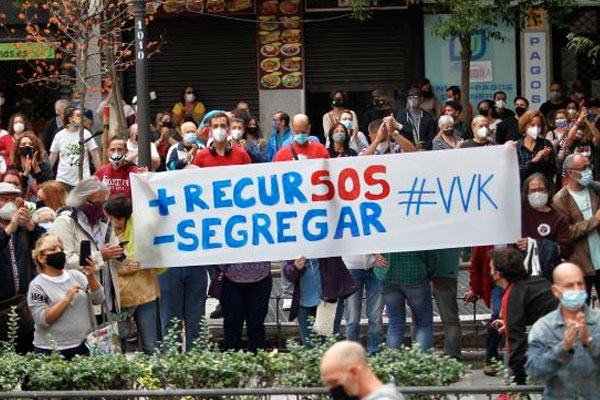
These are the consequences of Pedro Sánchez's policy of "national unity" endorsed by Pablo Iglesias and the ministers of UP. What does this policy consist of? It is that we must all pull in the same direction, or in other words, that in a health, economic and social crisis of this caliber, supposedly the interests of the financial oligarchy, of the IBEX 35, of the CEOE, are the same as those of the working class, the unemployed or the impoverished youth. The policy of national unity is the continuation of class collaboration in times of acute crisis.
The coalition government has not differentiated itself on fundamental issues from the Madrid right: have they promoted the nationalisation of private health care in order to mobilise their enormous resources in the fight against disease? Of course not, they have signed the same agreements with private clinics and hospitals as Ayuso.
Has the coalition government tried to nationalise banking and build a social shield worthy of the name to end unemployment, poverty and hunger queues? No, it has approved a package of 200 billion euros for the financial sector and the big businessmen of the IBEX 35. In other words, the policy of "national unity" means constant transfers of public resources to save the big capitalists, and crumbs for the working people.
The banks were bailed out after the 2008 crisis with more than 250 billion euros, of which they have paid back nothing, and they are taking the lion's share of the current government plans and European aid. But just now, Caixabank, Santander and BBVA are announcing the dismissal of tens of thousands of workers, while CEOs, chairmen and top executives are handing out multi-million bonuses and salaries of more than 10 million euros a year.
This policy of national unity, so lucrative for the bourgeoisie, has another face: safeguarding social peace at any price. Pedro Sánchez, without the UP ministers doing or saying otherwise, has tried to prevent the struggle on the streets by all means, sabotaging it through the trade union bureaucracy or resorting directly to the criminalisation of protest and police repression.
Let's be specific, La Moncloa has not made any substantial differences with Ayuso's policy on substantive issues. After almost a year and a half of coalition government, the labour reform, a fundamental tool that makes dismissals cheaper, has not been repealed. The same has happened with the Ley Mordaza, used to fine and criminalise the most combative struggles of trade unionism and social movements.
Public housing policy simply does not exist. Vulture funds and banks control the housing market at will, decide rental prices and evict left and right with the support of the courts and the police. The PSOE has systematically broken all the agreements it had reached with UP on these matters.
Pedro Sánchez has made it very clear which side of the barricade he is on. His staunch defence of Franco's monarchy, his refusal to investigate the emeritus' corrupt fortune and the escape plan hatched in collaboration with the Royal Household have made him a solid pillar of the '78 regime in his own right.
The PSOE leadership has been a guarantee of tranquillity for the powers that be. They have ignored the coup manifestos of the military and the chats of high commanders calling for the shooting of 26 million reds; they have justified police brutality against youth demonstrations; they have accepted the imprisonment of rappers for crimes of opinion; they have banned the 8M demonstrations in Madrid and of groups in defence of public services, while authorising Nazi demonstrations extolling the Holocaust against the Jews... All this has created an atmosphere of complete impunity for Vox and Ayuso to deploy their extreme right-wing demagogue without any restraint.
The president of Madrid has boasted of her permanent defiance of the state government, boasting that Madrid had a different model from that of the "social-communist" government. In reality, the fundamental difference in her administration is that Ayuso has said things more clearly and defended the class interests of her social base much more consistently.
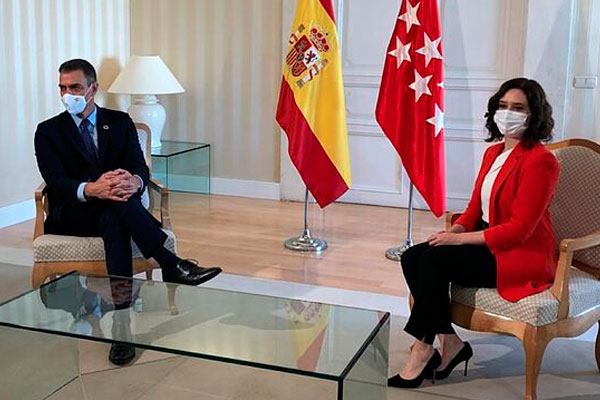
It is clear that Ayuso has ideologically confronted the left in the government at every turn. He has been able to spur on with the most classist and trumpist discourse the Madrid petty bourgeoisie, which has a very important weight in the capital and in the residential areas of the northern highlands, the wealthiest and most privileged sectors of the state, regional and local administration, the judiciary, the police and the army. The tens of thousands of small hotel owners, shop owners, farmers, rentiers and speculators who have amassed fortunes in the past boom years by ruthlessly exploiting cheap labour without rights, mainly young people and immigrant workers.
The PP has razed public education to the ground, and has done so consciously and systematically in order to boost the profitable business of subsidised private education. It has privatised all the public services of the Community, cleaning, transport, aid to dependency, public infrastructures, cultural centres, etc. And to all these sectors that maintain a "madrileña" lifestyle, that is to say, that live more than well, Ayuso has guaranteed that she will fight to the death against anyone who wants to touch their privileges.
The leader has stolen Vox's discourse, put it in her pocket and vomited it out day after day. This explains why the useful vote of the reaction has grouped around her figure, and Vox has only increased by one deputy. But we cannot underestimate Abascal's progress, even if it has been limited: from 280,667 votes and 8.88% in 2019, to 330,000 and 9.13% on 4 May.
In these elections, Pablo Iglesias has strongly launched the slogan of stopping fascism and defending "democracy". Logically, thousands of fighters who revolted against the ideas that were state policies under the bloody dictatorship of Franco have applauded and voted for him. But the problem is that the advance of the ultra-right is taking place under the protection of the "democracy" of the '78 regime - which keeps intact the state apparatus inherited from Franco and guarantees power to the oligarchy -, the decomposition of capitalism, rampant inequality and the absolute domination of financial capital.
Ayuso has achieved extraordinary results in the wealthy areas of Salamanca, Chamartín, Chamberí, in localities like Pozuelo, Majadahonda, Torrelodones... but he has also grown considerably in working class neighbourhoods and the southern localities, and in some like Carabanchel, Parla, Móstoles or Alcorcón he is even winning.
In working-class districts, the PP has increased its support, not only because it has won all the votes lost by Ciudadanos -which after these elections has been wiped off the political map-, but also because it has won many of those coming from abstention and a not inconsiderable part of those lost by the PSOE.
The reasons for this are not difficult to explain. When the economic crisis is hitting in a dramatic way hundreds of thousands of working families who are facing the abyss of losing everything and swelling the hunger queues; when the so-called "social shield" has proved to be a crumb incapable of preventing impoverishment; when hundreds of thousands of urban "day labourers'', working in precarious conditions in shops and bars, cleaning houses in wealthy areas or in the informal economy, are working in the informal economy and in the informal economy; when hundreds of thousands of urban "day labourers", working in precarious conditions in shops and bars, cleaning houses in wealthy areas or in the dependency sector, are abandoned to their fate by trade unions -CCOO and UGT- who refuse to organise them and fight to improve their working conditions and wages... When all these factors are produced and combined, and the possibility of a collective way out to face this catastrophe does not exist, what is imposed are individual solutions and the desperate search for survival.
The pro-capitalist politics of social democracy tries to crush class consciousness. It is a dissolving factor, introducing all kinds of prejudices and disarming the workers ideologically. Its propaganda, full of noise but empty of nuts, is powerless to solve the fundamental problems of the population. In this breeding ground Ayuso's discourse has found favourable ground.
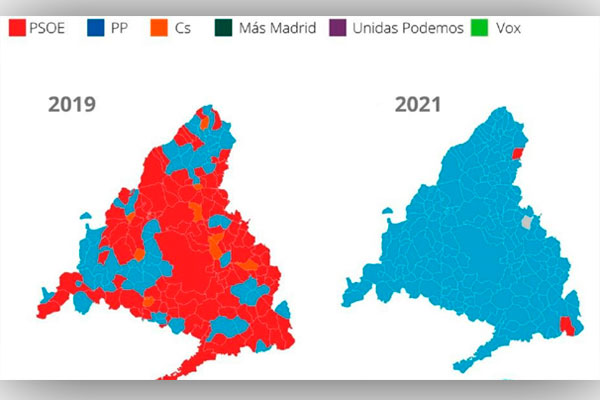
We have to be clear. With the kind of capitalist "democracy" advocated by the reformist left, you don't eat, you don't pay your bills, you don't make ends meet. Yes, the reactionary demagogy of the right has connected with a desperate section of the working class that sees itself abandoned by the traditional organisations of the left and thinks, wrongly, that Ayuso can activate the economy and keep jobs.
These are the reasons for the swing to the right that we have seen in the working class neighbourhoods and localities, and the fact that the PP has won more seats and votes than the entire parliamentary left put together.
Advised and supported by Aguirrismo and Aznarismo, Ayuso and her mentors have taken a step forward in the strategic reorganisation of the right-wing bloc based on an alliance with Vox. The logic of this approach is clear. Aznar made it clear a few months ago at a public event with Casado: reaction must be united at all costs, leaving aside hesitation, half-measures and concessions to the gallery. If we want to return to the Moncloa we must not fear an alliance with the extreme right. Defence of the system, of the business order, of the family, of repression, of the monarchy, the flag, the sacred unity of the homeland, of machismo, homophobia and racism.
Crisis in Podemos
As we have pointed out on numerous occasions, the participation of UNO Podemos in this government, far from dragging the PSOE to the left, is serving as a "progressive alibi" for a strategy that turns its back on the aspirations for which the workers have fought so hard for years.
From Izquierda Revolucionaria we have defended for some time now, when it was clear that the course imposed by the PSOE meant maintaining the recipes of austerity, that UP should leave the Council of Ministers and move to a forceful left-wing opposition.
This is clearly not the position of Pablo Iglesias or the UP ministers. They think that if they leave the government everything will be worse and that the PSOE will throw itself into the arms of the PP. Many honest militants on the left believe this reasoning. But we must base ourselves on experience. Whitewashing the policies of social democracy is having serious consequences: it weakens UP not only electorally, it also isolates them from broad sectors of the working class and youth before whom they have already burned much of their credibility.
The working class is practical and realistic, their living conditions impose it on them. When you hear from Pablo Iglesias that he is giving up everything to devote himself to university teaching and critical journalism, after such a landslide victory of the right, you can only think that the leader of Podemos is saying No se puede!
Many UP activists try to present the decision as something logical, due to the threats and infamies that Iglesias, Irene Montero and her family have to endure on a daily basis from the reaction and its media. This apparently "reasonable" argument was also used to justify their purchase of a villa in Galapagar, a predominantly right-wing and extreme right-wing area in the northern mountains of Madrid. With their money they can do whatever they want! it was claimed. But in politics, especially if you want to defend the cause of the oppressed, not everything goes.
Class-conscious workers cannot afford to give up the struggle even if we know the risks we run. If we do so, we become mere raw material for exploitation. That is what differentiates us from the enlightened petty bourgeoisie who enter politics with a redemptive and philanthropic pretension, but are afraid to change at the root the system of exploitation that the majority of the population suffers. This fear is objective: after all, they do not live so badly, and they will not compromise a comfortable status that exempts them from bending over backwards as wage slaves.
The rights that are really worthwhile have been won through very hard battles. Anti-Franco militants had to face ruthless repression, prison, torture, exile, even death. Iglesias speaks and agitates against the threat of fascism. And he is right to do so, but he is completely wrong to leave the battlefield and, above all, to cover up with this abandonment the critical exercise of a deep and honest reflection on the mistakes made.
Podemos is going through a very serious crisis of credibility. The beginnings are a long way off, when, supported by the formidable momentum of 15M, they burst onto the political chessboard and the two-party system. Their determined discourse against the caste, against the regime of 78, has been diluted until it has become unrecognisable. The approach developed by Pablo Iglesias during the election campaign has contrasted with the drift of recent years, but in fifteen days it is impossible to recover all the ground lost, and even less so if rhetoric is not accompanied by deeds.
The Podemos leadership does not want to build a fighting party of the left. It has given up having strong roots in the workers' movement and giving up the battle against the disastrous social pact policy of the trade union bureaucracy. It has staked everything on institutional work by embracing parliamentary cretinism, without understanding that the great social changes for the benefit of the working class are the fruit of mass struggle and the defence of a socialist programme that confronts the capitalist system.
Disassociating himself from Marxism, and after turning the party into an electoral machine, Pablo Iglesias abandons politics and appoints Yolanda Diaz as his successor. He presents the Minister of Labour as a guarantee for victory and as the next president of the government. He speaks of her enormous leadership and her qualities. But the facts show that Yolanda Díaz defends even more strongly the policies of class collaboration, boasting of her good relations with the CEOE and with the CCOO and UGT apparatuses.
The problem is not just one of leadership, and it is highly questionable whether Yolanda Díaz's leadership is better than Pablo Iglesias'. It is not about people, although people are important of course, but about the politics, the strategy and the programme of the left that calls itself transformative.
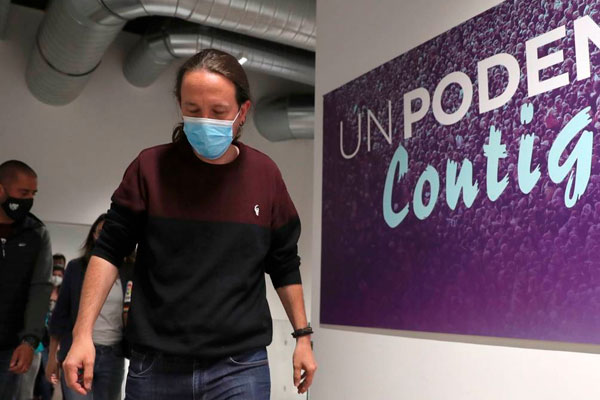
We need a Left that challenges the system
The results have been a blow to the morale of many activists, who view with deep concern the rise of the PP and Vox, and the power they now have at their disposal to storm the government in the next general election. Inevitably in the coming days, weeks and months we will suffer a bacchanal of reactionary ideas amplified by the media, and the usual analyses from the reformist left camp, which will blame the working class and youth for what happened in Madrid. This is not the first time.
During this campaign, the comrades of Izquierda Revolucionaria together with the Students' Union have deployed a massive intervention in the working class neighborhoods and in the localities of the south, defending an anti-capitalist, anti-fascist and anti-racist program and, without hiding our differences, we have called for a critical vote for Unidas Podemos and Pablo Iglesias. We are convinced that our position has been correct.
To stay out of this electoral battle and to renounce in practice to fight the right wing by putting forward our arguments has nothing to do with revolutionary politics. Much less is it to call for abstention or a null vote, a position that only benefits reaction and is the antithesis of the Marxist tactic of the united front.
The results in Madrid open a new political cycle. It is essential to assimilate the causes of what happened beyond the first shock. Neither laugh, nor cry, but understand.
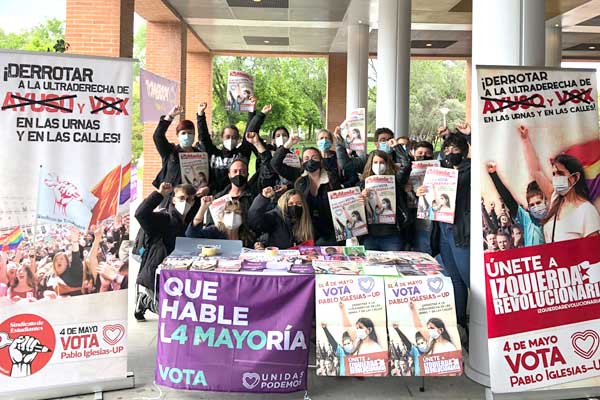
We need to ideologically rearm the workers' and youth movement to build a militant left that defends the programme of Marxism in the class unions, in the factories and workplaces, in the neighbourhoods, colleges and universities, in feminism and in the social movements.
This is the only way to defeat the ultra-right and to offer a socialist solution to the capitalist crisis.
Join Izquierda Revolucionaria!






